Greece and Germany and the weight of history
- Published
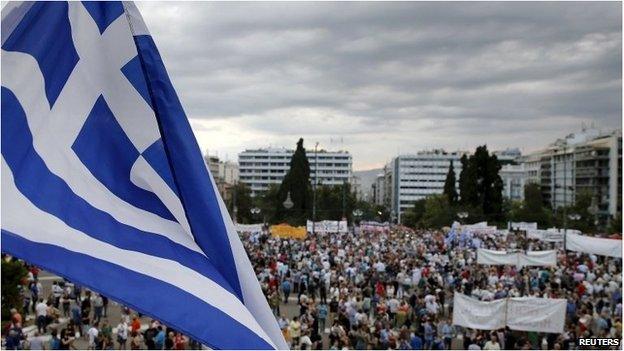
In the film The Godfather Michael Corleone is asked about Sicily: "Why is such a beautiful country so violent?"
"History," he replies simply.
The two main players in the current Greek crisis are Greece and Germany. History has taught the two countries different lessons and has complicated the search for compromise.
Even as the clock counts down towards default the shadow of the past still falls. Greece's chief negotiator Euclid Tsakalotos warned Germany against taking Europe back to the "politics we had in the 1930s".
Another Greek minister demanded €278bn ($315bn; £199bn) in reparations for Germany's wartime occupation.
Politicians in Berlin called that "'stupid" and a Bavarian MP accused the Greeks of "behaving like clowns at the back of the classroom".
'High price'
It has largely been that way since the Greeks revealed in 2009 that their accounts were as good as fakes and that their real deficit was close to 13%.
The Germans, initially, were against rescuing Greece. One of the conditions Germany had insisted on when it gave up its beloved Deutschmark was that countries would not have to take on the debt of others.
The German press was quick to discover a country riddled with corruption and political favours. Greece's swollen public sector had nearly a million workers, almost 20% of the working population.
There were irresistible details - more than 500 people receiving pensions would have been over 110 years old.
In a moment of candour the then Greek Deputy Prime Minister Theodoros Pangelos conceded: "We ate the money together."
In those early days of the crisis, in 2009 and 2010, Angela Merkel took to praising the wisdom and thrift of the Swabian housewife.
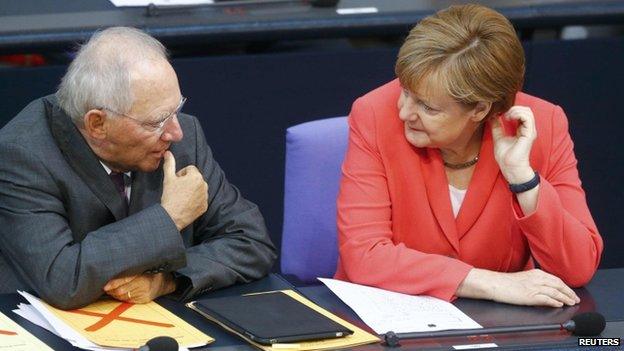
German Finance Minister Wolfgang Schaeuble and Angela Merkel
Her Finance Minister, Wolfgang Schaeuble, said that "Greece has to realise that when you break rules over a long period of time, you have to pay a high price."
It was Merkel's view too: "There are rules and they have to be adhered to," she said.
Merkel was against bailing out the Greeks, but the bond markets made it clear that the crisis went way beyond Greece. It threatened the entire single currency.
And the Americans demanded action. The United States Treasury Secretary, Timothy Geithner, told his European counterparts that "if Europe goes down, we'll go down with it".
Harsh conditions
The fear was that if Greece went bankrupt the crisis would spread to other heavily-indebted eurozone countries. It would be impossible to bail them all out and the markets would test what ultimately stood behind the euro.
The president of the European Central Bank, Jean-Claude Trichet, told Europe's leaders: "We have the worst financial crisis since World War Two."
In the face of such pressure Merkel gave way. Greece not only was bailed out but a giant fund was set up to demonstrate that Europe's leaders had the will and the means to stand behind any eurozone country with funding problems.
Greece was bailed out but it only piled debt on debt. The financier George Soros described the situation as "eerily reminiscent to the 1930s".
The rescue came with harsh conditions. Budget cuts of €30bn were demanded over a three-year period.
Many Greeks were outraged and took to the streets in a wave of protests. Some of the protests were anti-German.
There were placards with Angela Merkel dressed in Nazi uniform. The composer Mikis Theodorakis railed against debt servitude and what he called "the Germans' intention to impose on us a new Gauleiter".
Even though that was never the view of the majority of Greeks, the German press responded by portraying the Greeks as "lazy, profligate and irresponsible".
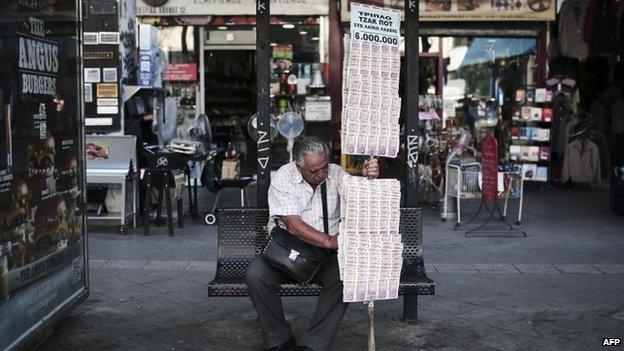
Greek lottery: one way to beat austerity in Athens
The best-selling tabloid Bild came up with the headline "sell your islands, you bankrupt Greeks. . . we give you cash, you give us Corfu".
The Greeks were slow to implement reforms and the medicine did not work. There were open doubts that it could work. "It is impossible to cut wages and prices by 30% without major riots," said Hans-Werner Sinn, president of the Institute for European Reform in Munich.
Others pointed out that "you cannot reduce the debt burden by shrinking the economy".
Frau Nein
Within a year Greece needed a second bailout. Other countries like Ireland and Portugal had had to be rescued. Merkel remained cautious and risk averse.
To much of Europe she was known as Frau Nein, a leader resistant to taking the big steps needed to save the single currency.
Some in Berlin began openly debating whether Greece should leave the euro.
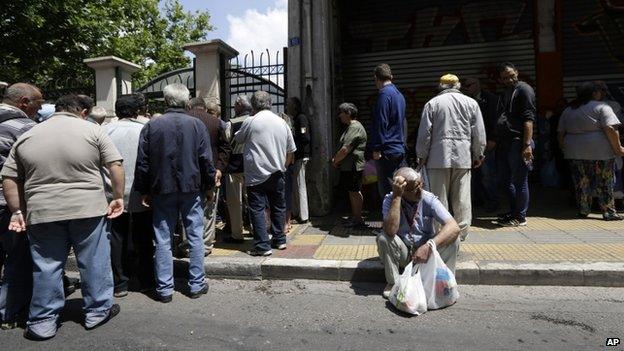
People waiting for a soup kitchen to open in Athens
And then Angela Merkel's language changed. She started describing the Greek problem as an existential crisis not just for the euro but for the entire European project: "If the euro fails, then Europe fails," became her much-repeated refrain.
She told her supporters that for Europe to survive it would have to integrate much more closely. That would mean "not less Europe but more Europe".
As part of the second bailout private investors took a haircut and the total of Greek debt fell but the economy was shrinking. It contracted by 25% in five years.
There were many who doubted that the policy could work. Former UK Chancellor Alistair Darling said that to impose on a country "something that would have been worthy of the Treaty of Versailles is absolutely ludicrous. It just isn't going to work."
In 2012 Angela Merkel took on the doubters inside Germany. "Some people," she said, "ask whether Greece isn't a bottomless pit. . . that the opportunities outweigh the risks of turning away from Greece. I believe those risks are incalculable and therefore irresponsible."
Chancellor Merkel threw her authority behind keeping Greece in the eurozone and for a period the crisis subsided.
'Great Depression'
It eased further when Mario Draghi, the president of the ECB, said he would "do whatever it takes to defend the euro".
But in Greece hardship was deepening. Suicides were up sharply. Middle-class families relied on soup kitchens.
The Greek prime minister told Bill Clinton that Greece was living through its "Great Depression".
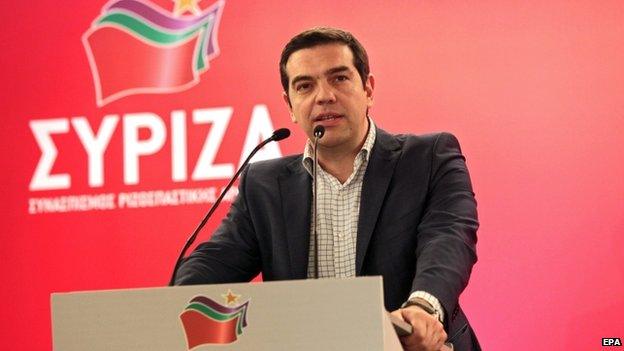
Prime Minister Alexis Tsipras has led Syriza since 2009
It was out of this mood of resentment and despair that the left-wing coalition Syriza, led by Alexis Tsipras, came to power this January.
His party believed they could count on the support of the French and the Italians in insisting that austerity had to be eased.
But the German voters - and those in other countries - were not in the mood for further concessions to a country that had already been loaned €240bn.
The German position was summed up by Wolfgang Schaeuble: "You get assistance, but only if you agree to go for reforms."
He stressed the word "only" by wagging his finger.
And during this period Angela Merkel had learnt a powerful lesson.
After the second Greek bailout the then Greek Prime Minister George Papandreou had surprised everyone by saying he would put the deal to a referendum.
The German chancellor realised that any leader could throw the eurozone into crisis.
The currency was vulnerable to a political squall. That could not continue. Leaders had to be bound by their commitments. The eurozone would not survive if it kept breaking its rules.
So she has used much of the past three years ensuring that countries inside the eurozone do not exceed their deficits. Wider reforms have greatly reduced the risk that a Greek default would undermine the eurozone.
The risks have certainly diminished even if they have not disappeared.
But Angela Merkel and the other eurozone leaders have been steadfast in insisting that countries had to be bound by their commitments.
The new Greek government's miscalculation was to believe that the fear of a default would force the Germans to compromise.
Greece in numbers
€320bn
Greece's debt mountain
€240bn
European bailout
-
177% country's debt-to-GDP ratio
-
25% fall in GDP since 2010
-
26% Greek unemployment rate
But the mood in Germany had hardened; some 58% of Germans say they want Greece to leave the euro.
As to the Germans, they under-estimated what austerity had done to the Greek people. Yes the Greeks had backed off some reforms but no economy in the modern era had shrunk by 25%. To the Germans it was about honouring commitments; to many Greeks it was about resisting further poverty and inequality.
If Greece defaults it will demonstrate that the eurozone is not irreversible. The day after it will be a different monetary union.
Angela Merkel's authority will be diminished. She has staked her legacy on insisting that "if the euro fails, then Europe fails".
Painful
No doubt a Greek departure would prompt a push for closer integration, for advancing fiscal and political union.
If a deal emerges then it will have to address the sustainability of Greece's debt. The country, which represents less than 2% of the euro-zone's economic output, owes over €320bn.
Greece will have to agree to more painful reforms but no deal will survive unless the country is given a route map to escape this crisis.
History shapes countries and, even now, nearly six years after Greece said it was in trouble, the past limits the room for compromise.